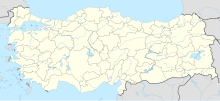Uşak Museum of Archaeology
| Uşak Arkeoloji Müzesi | |
| Established | May 23, 1970 |
|---|---|
| Location | Uşak, Turkey |
| Coordinates | 38°40′27″N 29°24′12″E / 38.67416°N 29.40326°E |
| Type | Archaeology |
| Collection size | 363 pieces of Karun Treasure and many other items from Bronze Age, Hellenistic and Ancient Roman Period. |
The Uşak Museum of Archaeology (Turkish: Uşak Arkeoloji Müzesi) is an archaeological museum in Uşak in western Turkey. Founded on May 23, 1970, the museum is best known for its exhibitions of Karun treasure.
In the museum, items on display include sculptures, pitchers with beaklike spouts and stone axes from the Bronze Age, earthen dishes and glassware from the Hellenistic and Ancient Roman Period, and stelae from the nearby Roman ancient ruin site of Blaundus. The most interesting items are of the so-called Karun treasure belonging to the Lydian Period.
The artifacts, making a collection of 363 pieces, date back to the 7th century BCE. They were illegally excavated by villagers in 1966 from the tomb of a Lydian noble woman, smuggled outside the country and sold to the Metropolitan Museum of Art (The Met) in New York, USA. After their discovery in a catalogue of the museum in 1984, Turkish journalist Özgen Acar informed the Turkish government, which launched a judicial case against The Met. After a legal battle, the collection was returned in 1993 to Turkey.
In 2006, it was discovered that two museum items were stolen and replaced by fake ones: a coin and a golden brooch in the form of a hippocamp. Kazım Akbıyıkoğlu, the director of the museum, was accused of the theft and placed in custody.
In November 2012, it was announced that King Croesus's golden brooch was to be returned to Turkey The Lydian Hoard treasure is in the shape of winged seahorse (hippocampus), now on display in the Ankara Museum of Anatolian Civilizations.
For thousands of years it lay underground, part of the buried treasure of the legendarily wealthy King Croesus, and, since being illegally excavated in the 1960s, it has been stolen, replaced by a fake, and sold to pay off gambling debts; and it has allegedly brought down a curse on its plunderers.
...
Wikipedia

